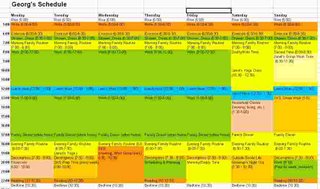The Wisdom of the Body
But instead the dogs woke me up, banging their tails on the wall and stuffing their cold wet noses under the covers. Huh . . . where's my phone? The phone was not beside the bed. I dragged myself up, peer at the bathroom clock in Mr. Magoo fashion, and see that it was 6:20 am. The phone was in the bathroom. The Silent switch was on, which means that the alarm would not have sounded. I gave the phone a scolding look. The phone winked its light innocently, as if to say, "Hey, buddy, don't look at me, I just do what I'm told."
So . . . how could I simultaneously be anticipating getting up early, and at the same time do all the things that guarantee I wouldn't wake up? The possibilities are:
- I just made a mistake, nothing more.
- My subconscious, knowing that I was slightly down on my sleep, pulled a fast one on me and engineered my "forgetting."
- Tiny elves dragged the phone to the bathroom, used a block-and-tackle to raise it all the way up to the countertop, read the online help, and figured out how to mute the phone.
The first explanation seems a little odd, since I've been doing the same set-the-alarm routine for the last two weeks without fail. And the third explanation is obviously outlandish, since elves are lousy at reading directions. So I'm left with the something in the middle . . . somehow, I "accidently-on-purpose" didn't set the alarm.
I am not inclined to make a big deal of it. I have been reminding myself that the Schedule is not about having absolute control of one's time. (Maybe certain OCD folks use it that way, but that's not my goal.) If anything, my Schedule is just the opposite: the superego has been ordered to stop over-controlling. I have recognized the very real limits of space and time. I am paying attention to reality now, instead of my own delusional notions of what ought to be.
In this case, I will defer to the body. The Body needed more sleep. The Body took what it needed. Why should I complain? Instead of seeing my body as an unruly subject of my domain, defying my will, I should recognize it for what it is: a force of nature, a temperamental god, one that delivers miraculous bounty with cyclical regularity, and which also, occassionally, requires appeasement.
Labels: Psychology

